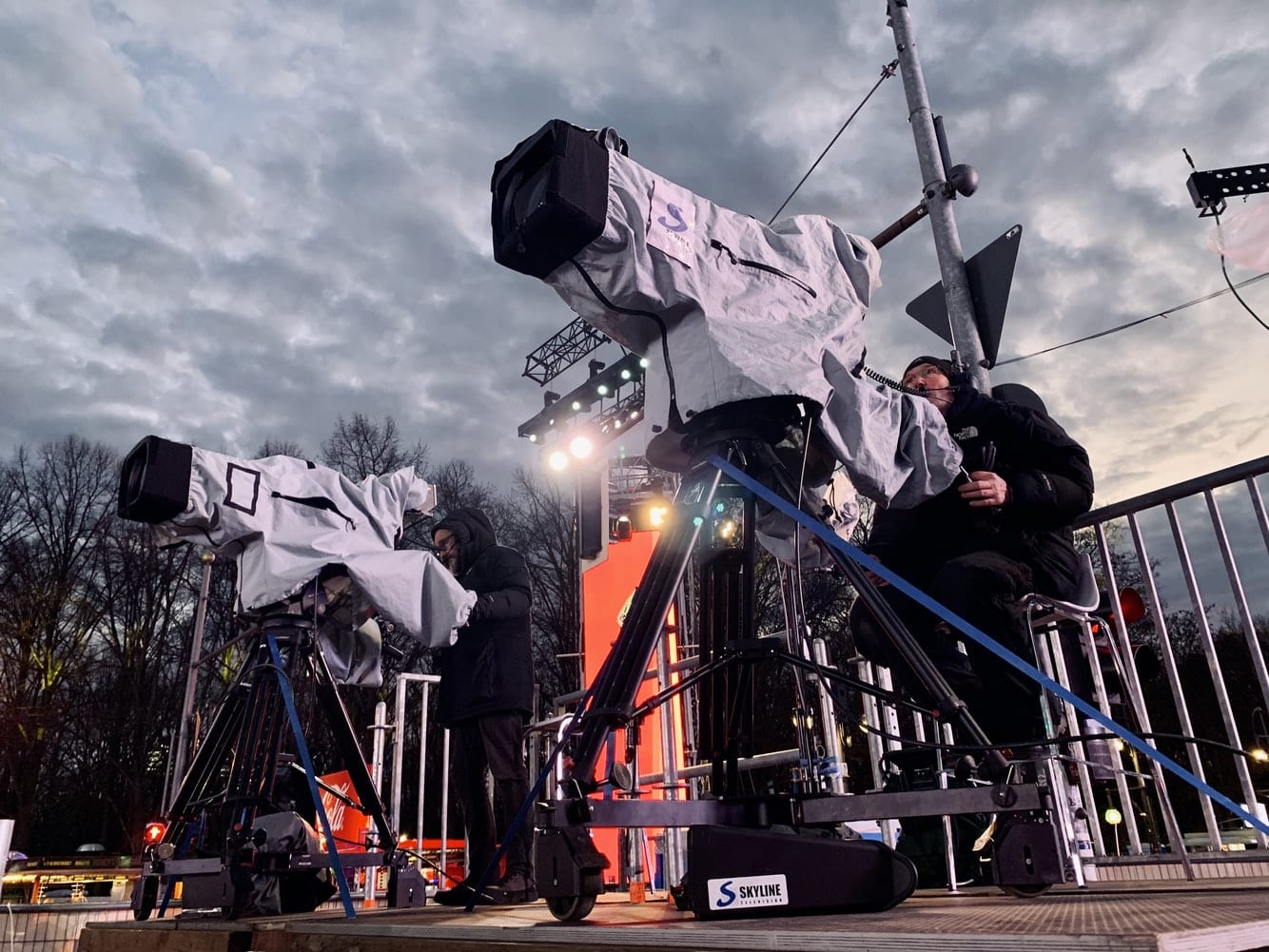Comprehending Event Production: Why It Is Essential for Successful Events
Event production plays an essential function fit successful events. It includes cautious planning, sychronisation, and execution to ensure every information straightens with the event's vision. This procedure not just boosts participant experiences yet also assists in purposeful connections among individuals. Recognizing the intricacies of event production can considerably influence the general end result. What are the key aspects that add to an effective event, and how can they be properly taken care of?
The Duty of Event Production in Producing Memorable Experiences
Although lots of aspects add to the success of an event, event production plays an essential duty in crafting remarkable experiences. This complex process encompasses various aspects, including planning, logistics, and execution. Effective event production assurances that every detail lines up with the total vision, creating a seamless flow that captivates attendees. By coordinating timelines, managing sources, and overseeing technical elements, event producers establish a foundation for impactful experiences.Moreover, they curate settings that resonate with the target audience, enhancing engagement and emotional link. From choosing appropriate venues to integrating ingenious modern technology, the options made during production considerably influence just how guests perceive and remember the event. By focusing on top quality and interest to detail, event production changes common events into extraordinary minutes, leaving lasting impressions. Inevitably, the proficient orchestration of these parts defines the essence of an occasion, showcasing the importance of expert event production in achieving exceptional end results.
Trick Components of Effective Event Production
Reliable event production depends upon a number of crucial parts that ensure success. Preparation and coordination develop a solid structure, while technical arrangement requirements attend to logistical needs. Additionally, carrying out audience engagement methods enhances the general experience, making the event unforgettable.
Preparation and Coordination
Preparation and coordination work as the foundation of successful event production, ensuring that every information aligns effortlessly to create an unforgettable experience. Reliable planning involves establishing a clear vision and goals, while sychronisation involves the precise company of logistics, timetables, and sources. A well-defined timeline is vital, leading all stakeholders through crucial landmarks and jobs. Communication plays a pivotal function, fostering cooperation among staff member, vendors, and place staff. Regular meetings and updates help to deal with difficulties immediately, making certain that everyone remains aligned with the event objectives. Inevitably, a structured strategy to preparation and control not only boosts effectiveness yet additionally greatly adds to the overall success and satisfaction of the event for guests and organizers alike.
Technical Setup Requirements
A successful event depends heavily on its technical setup needs, which include essential elements such as audio-visual devices, lights, hosting, and connection. Audio-visual equipment consists of microphones, audio speakers, and projectors, ensuring that presentations and efficiencies are delivered plainly. Proper illumination enhances the setting and highlights key areas, while organizing supplies the required platform for audio speakers and entertainers. Connectivity, consisting of Wi-Fi and electrical accessibility, is crucial for seamless interaction and technology assimilation. Each component has to be carefully prepared and carried out, customized to the event's specific demands. Insufficient technical configurations can cause disturbances, adversely influencing the total experience for guests, underscoring the significance of comprehensive preparation and attention to information in event production.
Target Market Involvement Strategies

The Significance of Planning and Coordination
Planning and control are vital to the success of any kind of event production. Reliable timeline administration, resource allotment techniques, and team communication dynamics play crucial functions in making sure that all elements collaborated seamlessly. Without a structured technique to these facets, events take the chance of encountering hold-ups, budget plan overruns, and miscommunication amongst team members.
Effective Timeline Monitoring


While successful event production usually rests on creative thinking and implementation, reliable timeline monitoring stays a crucial aspect that can not be overlooked. A well-structured timeline functions as the backbone of any kind of event, ensuring that each stage is executed in a prompt manner. It allows for the sychronisation of various tasks, from location setup to visitor arrivals, while avoiding prospective traffic jams. By clearly laying out deadlines and responsibilities, event organizers can keep focus and adjust to unforeseen difficulties. Furthermore, a diligently crafted timeline promotes interaction amongst staff member, advertising accountability and partnership. Ultimately, reliable timeline administration not just enhances functional performance but likewise contributes significantly to the total success and smooth execution of the event, leaving participants with a memorable experience.
Resource Allocation Strategies
Efficient resource appropriation strategies are important for the effective execution of any kind of event. Correct preparation enables event organizers to identify and disperse sources, such as funds, personnel, and materials, in a way that makes best use of performance. By evaluating the details demands of each facet of the event, organizers can focus on jobs and allot sources as necessary. Control amongst various divisions makes certain that all components, from accommodating audiovisual needs, are effectively sustained. This critical method not just lessens waste but also boosts the overall experience for guests. Furthermore, anticipating prospective challenges and having contingency strategies in position allows for smoother procedures. Inevitably, reliable resource allowance adds significantly to achieving event objectives and assuring an unforgettable event.
Group Communication Characteristics
Just how can seamless communication amongst employee change the event production process? Reliable go to these guys communication is important for coordinating jobs, sharing updates, and attending to challenges in real-time. When group members take part in open discussion, they can rapidly recognize prospective issues and establish services collaboratively, decreasing hold-ups and misunderstandings. This vibrant fosters a cohesive setting where everyone recognizes their roles and duties, causing a more integrated initiative. Furthermore, normal check-ins and feedback loopholes improve liability and assurance placement with the event's objectives. By focusing on communication strategies, teams can simplify workflows, boost spirits, and ultimately boost the general top quality of the event. Successful gatherings pivot on the ability to interact properly, making it a crucial component of event production.
Enhancing Guest Engagement With Innovative Style
Creative style plays a critical role in improving guest involvement at events, as it fosters an immersive atmosphere that mesmerizes individuals' interest. By integrating innovative visuals, interactive components, and thematic decor, event planners can produce unforgettable experiences that reverberate with participants. Thoughtful design styles advertise activity and expedition, encouraging guests to interact with display screens and each other.Incorporating technology, such as augmented truth or live polling, additional enhances the experience, permitting real-time responses and communication. In addition, sensory aspects like illumination, sound, and scent can stimulate emotions and create a more engaging atmosphere.The usage of storytelling through design helps convey the event's purpose and message, making it much more relatable for participants. Ultimately, imaginative style not only enhances involvement yet also deepens links among participants, leaving a lasting impression that expands beyond the event itself. This strategic approach to style is necessary for effective gatherings.
Handling Logistics for a Smooth Implementation
While the exhilaration of an event can attract guests in, handling logistics is vital to safeguard a seamless execution. This involves meticulously working with different elements, from place choice and layout to catering and transport. Reliable logistics administration assures that all components align, permitting a smooth flow from enrollment to the conclusion of the event.Additionally, a clear interaction plan amongst all stakeholders is vital. This consists of staff, suppliers, and volunteers, who have to be notified of their roles and obligations. Anticipating prospective challenges, such as devices failure or unforeseen climate condition, can further enhance the event's success.Creating a thorough timeline assists maintain the team on track and enables timely adjustments. Eventually, well-managed logistics not just help with an enjoyable experience for guests but additionally reflect the professionalism and dependability of the coordinators, adding to the general success of the celebration.

The Effect of Technology on Event Production
What role does technology play fit contemporary event production? Technology has actually ended up being a cornerstone of effective event production, improving both preparing and execution processes. From innovative enrollment systems to interactive applications, modern technology simplifies participant administration and boosts interaction. Digital event systems enable organizers to get to wider target markets, breaking geographical obstacles and assisting in hybrid celebrations that combine in-person and on-line experiences.Additionally, audiovisual technologies, such as high-def screens and sound systems, boost the high quality of discussions and performances, making sure a memorable experience for guests - event production charlotte. Social media site assimilation enables real-time responses and interaction, promoting area engagement previously, throughout, and after the event. Information analytics tools help coordinators in monitoring participant habits and choices, enabling customized experiences that reverberate with varied target markets. Overall, the combination of modern technology in event production not only improves functional performance yet additionally enriches participant experiences, inevitably adding to the success of the event
Assessing Success: Determining the Results of Your Event
Success in event production rests on reliable analysis, which includes determining a range of results to examine the total influence of an occasion. To attain this, coordinators can employ both qualitative and measurable metrics. Measurable actions might consist of presence numbers, ticket sales, and earnings created, while qualitative analyses could entail guest satisfaction studies and feedback forms.Additionally, analyzing social networks engagement and media coverage can provide understandings right into the event's reach and brand name effect. Comparing these metrics against predefined objectives assists figure out if the goals were met.Furthermore, post-event debriefs recommended you read with the planning team can uncover lessons found out and locations for enhancement. By systematically reviewing these end results, event manufacturers can improve future gatherings, making certain continual growth and success. Ultimately, a comprehensive assessment not only highlights achievements yet likewise informs critical decisions for subsequent events, promoting a culture of quality in event production.
Frequently Asked Inquiries
What Certifications Should an Event Manufacturer Have?
Event producers should have strong business skills, creative thinking, and effective communication capacities. A background in task management, budgeting, and arrangement is vital. Relevant accreditations and experience in diverse event kinds even more boost their qualifications.
Exactly How Can I Reduce Event Production Expenses Effectively?
To properly decrease event production expenses, one can streamline vendor option, negotiate contracts, make use of internal resources, focus on essential aspects, apply technology for effectiveness, and explore sponsorship chances to counter costs without endangering quality.
What Are the Usual Difficulties in Event Production?
Usual challenges in event production consist of spending plan restraints, logistical sychronisation, supplier monitoring, time limitations, attendee interaction, technological troubles, and unpredicted situations - event production charlotte. Each factor can considerably influence the total success and smooth execution of the event
How Do I Choose the Right Location for My Event?
Selecting image source the right location includes thinking about variables such as area, ability, amenities, and spending plan. In addition, evaluating ease of access and atmosphere ensures the chosen space aligns with the event's objectives and enhances the total attendee experience.
What Is the Common Timeline for Planning an Event?
The regular timeline for intending an occasion differs, however typically includes stages such as principle growth, venue selection, vendor control, promo, and last preparations, frequently spanning a number of months to guarantee an effective execution.